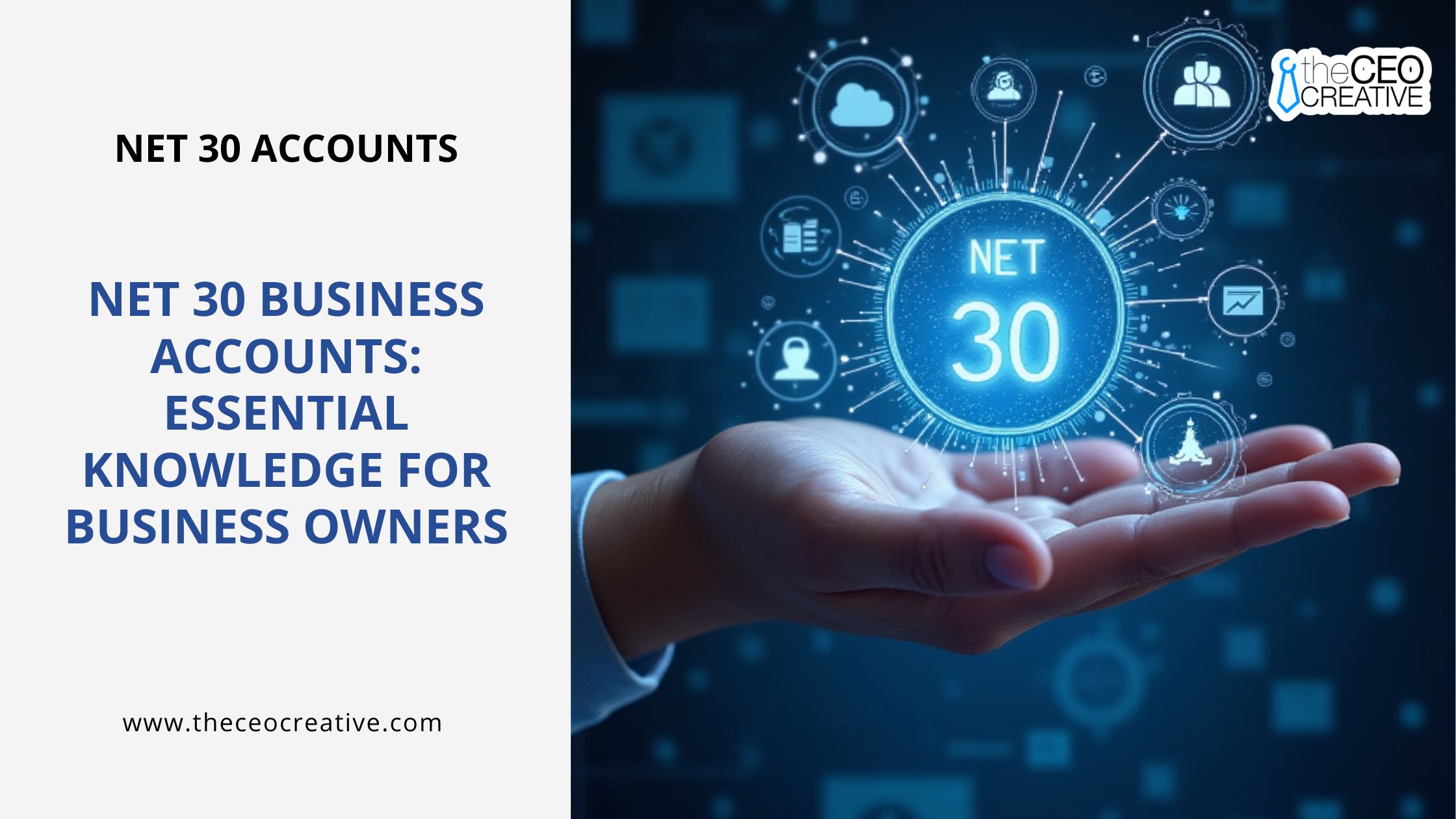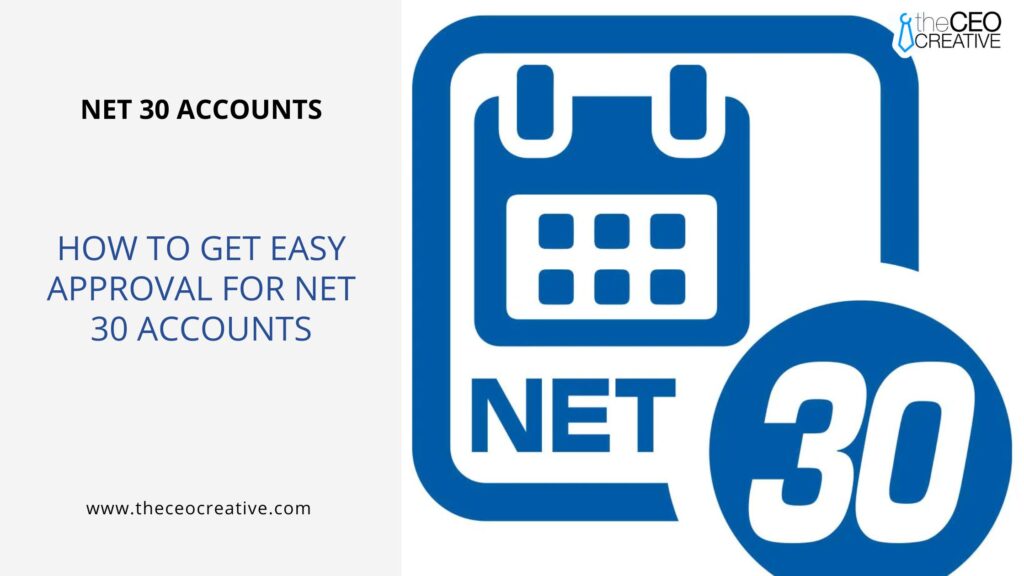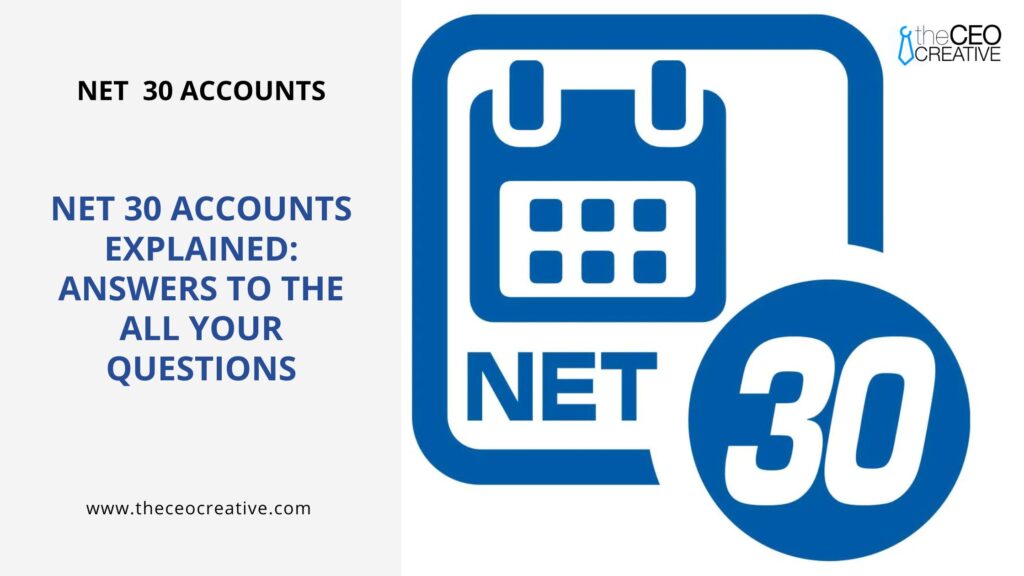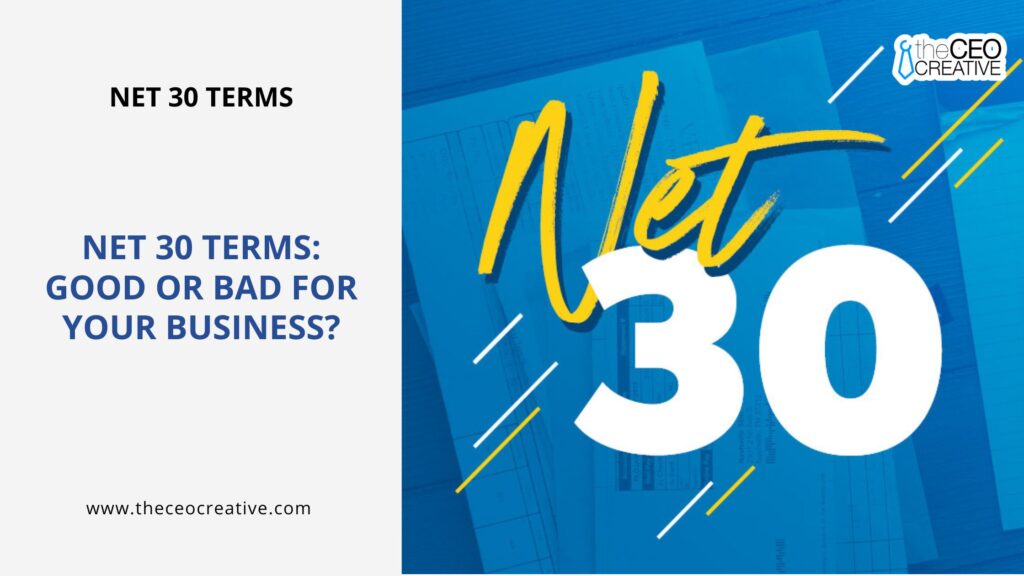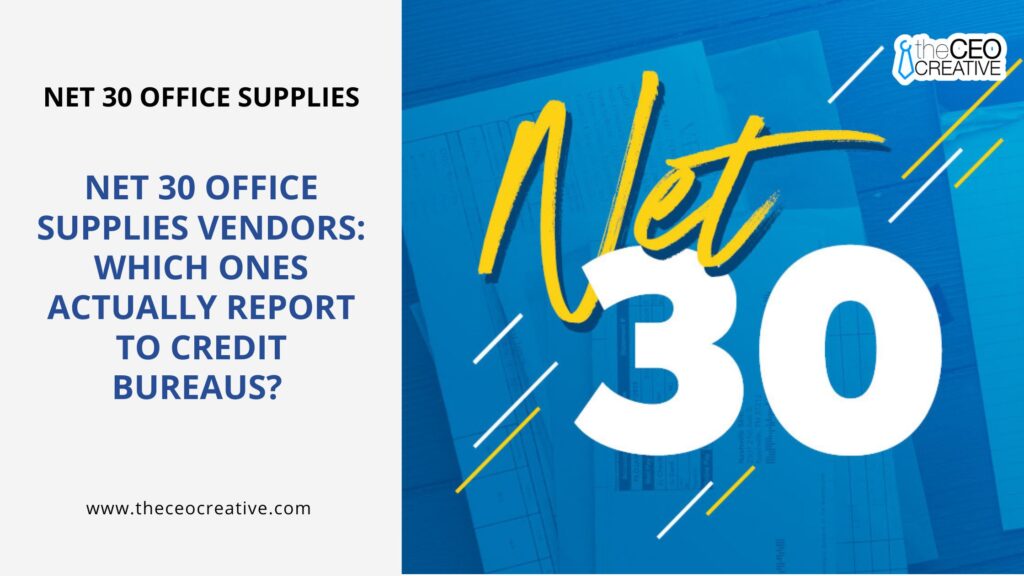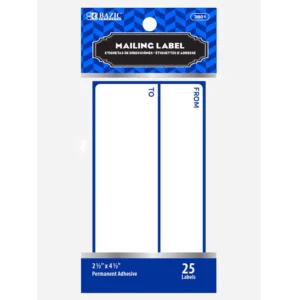Hey there, fellow business fans! Ever feel like you’re walking a tightrope while trying to manage your company’s money? You’re in this together! Keeping track of cash flow can seem like a three-ring circus, but there’s a helpful tool that can make it a lot less stressful: Net 30 business accounts. These handy accounts can really change the way you handle invoices and payments, making things financially easier. Whether you’re a brand new business or you’re trying to make things run more smoothly, knowing about Net 30 accounts is a big help for calm financial waters. Let’s take a closer look at how these accounts can give your business some financial relief!
Benefits of Net 30 Accounts for Business Owners
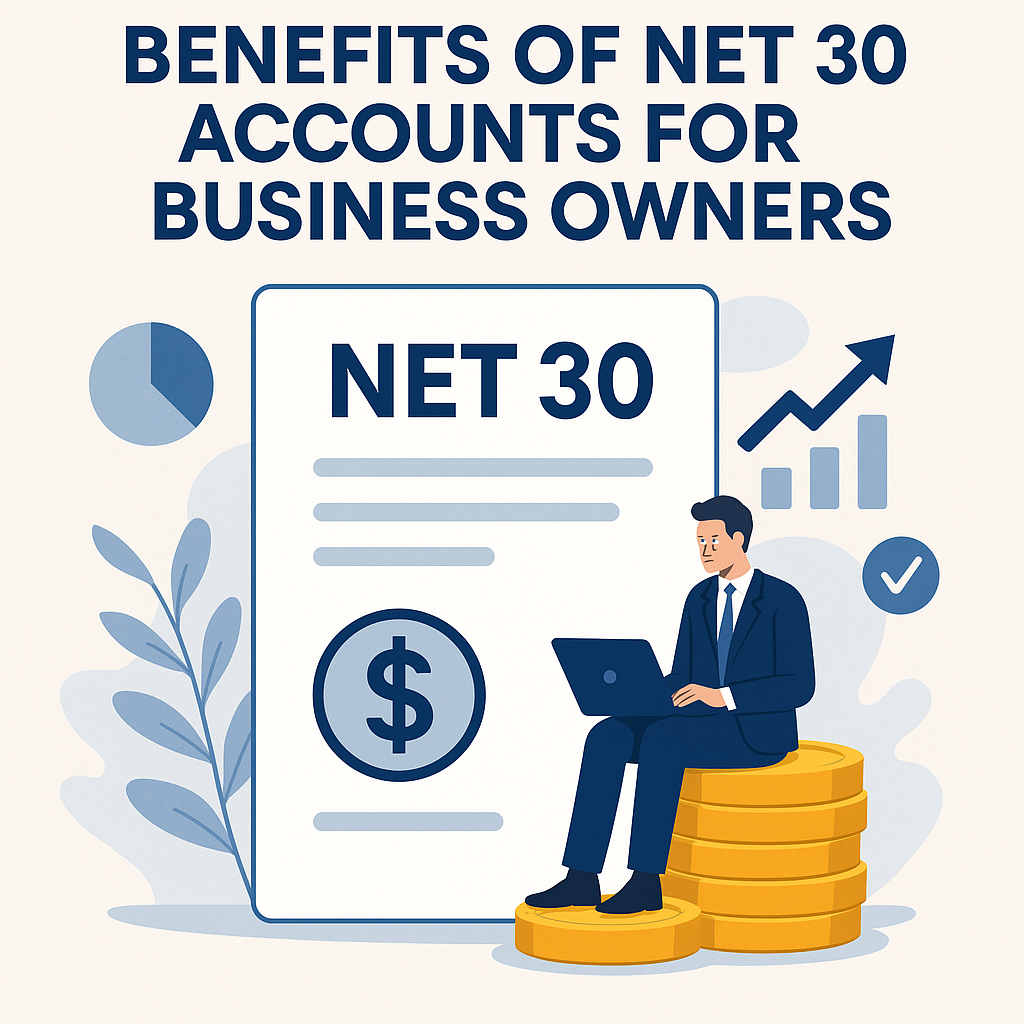
As a business owner, managing your finances can often feel like walking a tightrope. Fortunately, Net 30 accounts act like a safety net, helping you keep your balance and run things smoothly. Let’s explore why these terms can be a real game-changer for your company.
Improved Cash Flow Management
Think of cash flow as the oxygen your business needs to survive. When it’s flowing smoothly, your company is bustling with energy, ready to grow and conquer new challenges. Using Net 30 accounts can be a real lifesaver when it comes to managing that cash flow effectively. Let me explain how:
– Buying Time with Payments: Imagine having a 30-day grace period when you buy something. That’s essentially what Net 30 accounts do. Instead of paying upfront, you get 30 days to settle the bill. This extra time is like a financial safety net, letting you handle your costs without having to raid your savings.
– Knowing When the Bills Are Due: With a clear 30-day deadline for payments, you can plan your spending with more confidence. It’s like having a roadmap for your finances, helping you anticipate your needs and ensure you’ve got enough money in the bank when it’s time to pay.
– More Room to Maneuver Financially: With the cushion of a Net 30 arrangement, you’re free to focus on smart investments, unexpected expenses, or any other financial priorities that pop up.
Strengthening Business Credit
Having a strong credit history is absolutely vital for the long-term success of any business. Here’s how Net 30 accounts can give your creditworthiness a boost:
– Showcasing a Good Payment Record: If you consistently pay your Net 30 invoices on time, you’ll build a positive payment history. This is a huge deal for credit bureaus when they’re figuring out your business credit score. A track record of on-time payments demonstrates reliability and shows you’re good for the money.
– Building Strong Credit References: Suppliers who offer Net 30 terms often share your payment history with business credit reporting agencies. A strong history of timely payments can lead to better credit references, which is super helpful when you’re trying to get more credit lines or loans.
– Broadening Your Credit Mix: Using Net 30 accounts alongside other payment methods diversifies your credit profile. It tells creditors that your business can handle different types of credit effectively, ultimately improving your overall credit standing.
Enhanced Supplier Relationships
Good relationships with suppliers go beyond simply acquiring goods or services; they’re a fundamental part of running a successful business. Here’s how Net 30 accounts help foster these crucial connections:
– Build Trust: When you reliably meet your payment obligations within the Net 30 timeframe, you build trust and good faith with your suppliers. This trust can be invaluable if you ever need to work out more favorable terms or place an urgent order.
– Gain Priority Access: A solid relationship with suppliers can mean getting priority when it comes to their products, services, or special deals. Suppliers appreciate partners they can count on, and they’re more inclined to give favorable terms to businesses they trust.
– Increase Your Leverage: A history of on-time payments can strengthen your hand in negotiations for discounts or improved terms. Suppliers are generally happy to reward loyal and dependable customers with better rates or more convenient invoicing options.
Setting Up a Net 30 Account
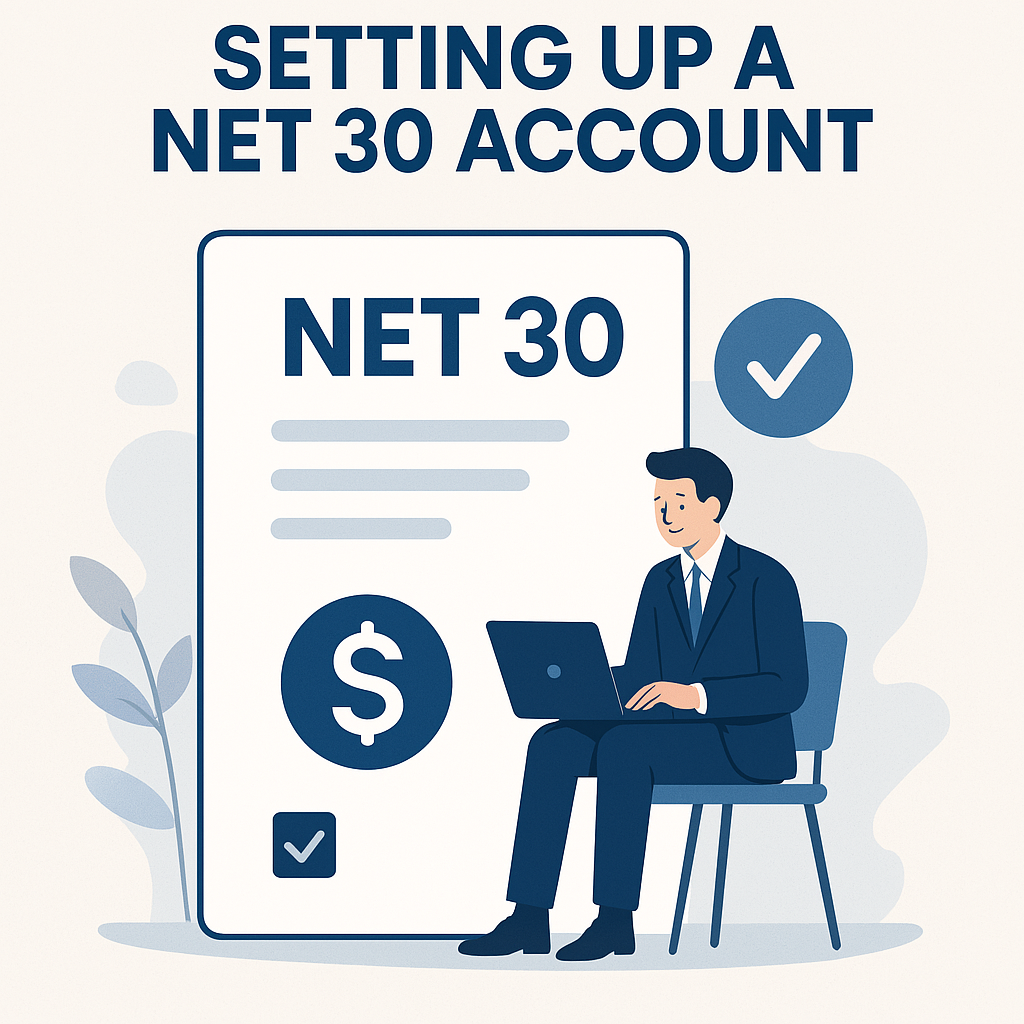
Now that you’re aware of the benefits, let’s discuss how to set up a Net 30 account for your business. Here’s a step-by-step guide to get you started on the right foot.
Choosing the Right Suppliers
The first thing you need to do when setting up a Net 30 account is to choose the right suppliers. It’s really important to think about a few things before you pick them:
– How they fit with your business: Pick suppliers that sell things your business really needs to run smoothly. This could be anything from raw materials and office supplies to essential services – basically, anything that helps you do your main job.
– Are they trustworthy? Do some digging to make sure the suppliers you’re considering have a good name and are reputable. Checking out reviews, asking for references, and making sure they’re in good standing can give you a good idea of whether you can rely on them and if they provide good service.
– Do they report your payments? It’s a good idea to go with suppliers who tell credit bureaus about how you pay. This can really help you build your business credit because consistent, on-time payments reported to these bureaus can significantly improve your business credit score.
Establishing Your Business Credit Profile
Building a solid business credit history is key to securing those beneficial Net 30 payment terms. Here’s a breakdown of how you can build and boost your creditworthiness:
– Officially Register Your Business: Get your business officially on the books. This could involve structuring it as an LLC, S-Corp, C-Corp, or just plain registering it as a sole proprietorship. This official registration is often a must-have before you can start building business credit.
– Get an Employer Identification Number (EIN): Think of your EIN as your business’s own Social Security number. You’ll need this to open a business bank account, apply for business credit cards, and set up those Net 30 accounts.
– Set Up a Business Bank Account: It’s super important to keep your business and personal finances separate. Having a dedicated business bank account not only makes your business appear more financially sound but also makes bookkeeping and accounting way easier.
– Monitor Your Credit: Regularly review your business credit reports for accuracy, and address any discrepancies promptly. Monitoring helps you stay aware of your credit standing and improve areas where your business profile may need enhancement.
Application Process for Net 30 Accounts
Alright, so you’ve found some great suppliers and built up a decent business credit history – now it’s time to go for that Net 30 account. Here’s how to make the application process go as smoothly as possible:
– Get Your Papers Ready: Make sure you have all the important documents handy, like your business license, tax ID number, and financial statements. You’ll probably need to show these during the application.
– Fill Out the Form: Take your time and fill out the supplier’s Net 30 application completely. They’ll likely ask for details about your business, credit references, and bank information. Double-check everything to make sure it’s accurate, since a poorly filled-out application can slow things down or even get your application rejected.
– Read the Fine Print: Before you sign anything, take a good look at the terms and conditions. Pay extra attention to when payments are due, what happens if you’re late, and whether they report to credit agencies. Knowing all this stuff upfront will save you from any nasty surprises down the road.
– Submit Your Application: After you’ve finished filling out all the necessary documents and forms, it’s time to send in your application. Different suppliers have different ways of doing things. Some might give you the green light based on your credit history, while others might ask for a personal guarantee or a deposit upfront.
– Start Using Your Account: Once you get the thumbs up, start using your Net 30 account to buy the things your business needs. Just remember to pay your bills on time. This will help you build a good relationship with the supplier and give your business credit score a nice boost.
Taking these steps can give your business the financial edge it needs to expand and thrive. Keep in mind that every big adventure starts with a single step, so take this chance to discover what Net 30 accounts can do for your company right now!
Tips for Managing Net 30 Accounts Effectively

Managing Net 30 accounts is like having a superpower for your business’s cash flow. Get ready to make the most out of it by following these practical tips.
Keeping Track of Payment Deadlines
The key to rocking your Net 30 account? Being on time, every time. Here’s the lowdown on how to stay ahead of the game:
– Get a Calendar System Going: Whether you’re all about that digital life or a fan of good old pen and paper, a calendar is your secret weapon. Mark those due dates with eye-catching colors and maybe even set up some reminders a few days beforehand so you’re never caught off guard.
– Make Regular Check-ins a Thing: Set aside time each week to scope out upcoming payment deadlines. This way, you’ll spot any sneaky payments that are creeping up on you, avoiding late fees and keeping your credit record sparkling.
– Know What to Tackle First: If you’ve got a bunch of payments due around the same time, sort them by what’s most urgent or important. This keeps your relationships with vendors running smoothly and prevents anything from falling through the cracks.
– Pad Your Budget: Build a little financial cushion into your budget. You never know when a client might be a bit late with their payment, and having this buffer means you can still meet your obligations without breaking a sweat.
With these tactics, your company can successfully handle the turbulent waters of payment due dates, ensuring your vessel stays stable and on track.
Utilizing Financial Tools and Software
Technology exists to simplify our lives, and handling Net 30 accounts is no different. With appropriate financial tools and software, businesses can refine and improve their payment procedures. Here are some tech-wise approaches:
– Accounting Software: Consider using well-regarded accounting software such as QuickBooks or FreshBooks. These programs typically include features for handling invoice deadlines, notifying you about upcoming payments, and generating reports to give you a clear picture of your cash flow.
– Establish Alerts: Use software that lets you customize alerts for both incoming and outgoing funds. Certain systems provide mobile app alerts, allowing you to keep tabs on your finances from anywhere.
– Automate When Feasible: Automation can significantly reduce the time you spend on tasks. Configure automatic payment schedules in accordance with your Net 30 terms to prevent setbacks caused by human error, guaranteeing punctual payments with minimal effort.
– Digging into the Numbers: Get your hands on tools that do a good job analyzing and reporting your finances. They’re super helpful for figuring out how offering Net 30 terms shakes up your cash flow and for spotting trends that can guide your financial decisions.
Jumping on these tech solutions doesn’t just buy you time, it also tightens up your financial game, making everything run smoother and more effectively.
Communicating with Suppliers
When using Net 30 accounts, having a solid connection with your suppliers is absolutely essential. Good communication acts like the bond that strengthens this vital partnership. Here’s how to get it right:
– Be Open and Honest: Always be upfront and clear in your interactions with suppliers. Let them know exactly how and when they can expect payments. By being open about this from the start, you build trust and make sure everyone’s on the same page.
– Work Out Terms: If money’s tight, don’t be afraid to ask for more manageable payment terms. Most suppliers would rather work something out than risk not getting paid at all.
– Keep in Touch Regularly: Make a point to communicate with your suppliers frequently. This shouldn’t just be when problems pop up—consistent communication should be your standard practice. Regular check-ins create a sense of teamwork, where both sides get each other’s needs and can make plans together.
– Show Your Gratitude: Never underestimate the power of a simple “thank you.” It might seem small, but expressing appreciation can make a big difference in your professional relationships. Recognizing how much a supplier contributes to your company’s achievements can really solidify your bond and build positive feelings.
– Tackle Problems Together: When problems pop up, handle them by working as a team. Instead of playing the blame game, focus on finding a solution that works for everyone. Being proactive this way helps stop little problems from turning into big headaches.
Good communication is absolutely vital for successful business partnerships, particularly when money matters are involved. Keeping the lines of communication open and treating your suppliers with respect will make your transactions run more smoothly and keep your business running like a well-oiled machine.
Conclusion
Net 30 business accounts can be a great way to manage your company’s cash flow. They give you a 30-day window to pay invoices, which helps keep things running smoothly while you manage your expenses and income. Just remember a few things:
– Building good business credit doesn’t happen overnight, so stick with it and be consistent.
– Pick the accounts that are the best match for what your business needs.
– Keep track of those payment deadlines to keep your cash flow healthy.
If you know how to use them, net 30 accounts can really help your business thrive and stay stable over time.

